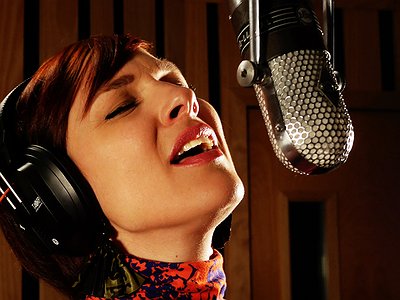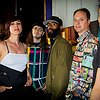Part 1
Name: Gabriela Martina
Occupation: Vocalist, composer, bandleader
Nationality: Swiss
Current release: Gabriela Martina's Homage to Grämlis is out now. Order the album on her official webstore.
If you enjoyed this Gabriela Martina interview and would like to find out more about her music, visit her official homepage. She is also on Instagram, and Facebook.
Where does the impulse to create something come from for you? What role do often-quoted sources of inspiration like dreams, other forms of art, personal relationships, politics etc play?
Ideas mostly come to me when I’m not looking for them.
It’s during my daily run outdoors or while riding my bicycle in the city. Sometimes while doing the dishes or after a phone call with a friend or family member. The most difficult part for me is consciously sitting down and devoting the time to write something new. Deadlines give kicks but can also cause pressure. That’s when I listen back to recorded snippets of random ideas on the voice memo on my phone.
Never would I have dreamt about writing a rather political album with my upcoming album STATES (slated for release in 2024 – election year). But here I am. The music guided the process and here I was with some gibberish words starting to make all kinds of statements, telling stories and asking questions about the current world situation.
All with a huge hint of sarcasm and a good portion of real humor as well.
For you to get started, do there need to be concrete ideas – or what some have called a 'visualization' of the finished work? What does the balance between planning and chance look like for you?
Without a story or a basic concept for a future project / album it would be hard for me to get started. Usually the problem is not the ideas for a new concept, it’s more the execution of it musically. If I’d have all the resources and time in the world, I think I’d already have a tons more music out there.
As mentioned above, a grant does help in order to have clear deadlines as well as the resources in order to do our work as musicians. But I wish musicians could actually earn their money from their music and wouldn’t have to rely on such foundations, patrons or fundraising campaigns in order to realize their projects.
Writing grant applications is an entire other profession and takes time away from the creative process.
Is there a preparation phase for your process? Do you require your tools to be laid out in a particular way, for example, do you need to do 'research' or create 'early versions'?
That really depends on the project. My newest album Homage to Grämlis (July 14th 2023) required for me to do quite a bit of research. Even though I grew up yodeling and had small yodel performances with my family, for the particular genre it is I had to delve myself quite into learning different styles from different parts of Switzerland.
On that journey I also discovered that yodeling is a form of singing that’s used in so many other folk traditions of the world and goes as far as to the West-Pygmies. In Sweden they have ‘kulning’, which is a Scandinavian singing style that sounds similar to calling the cows back into the stable as we used to do on the farm ‘Grämlis’ I grew up on in Horw, Switzerland.
With any album in my case, there are tons of tunes that I ended up not putting on the album itself for various different reasons. Most of them unfinished. I feel that is a natural part of the writing process. As long as keeps trying to compose, there might be one idea out of one hundred musical ideas that comes out as ‘the one’ and you continue with it.
Sometimes for no particular reason but an instinct, a gut feeling tells you to stay on it and keep going, keep developing it. When that ‘flow’ happens, I am in love with music and I feel the love from music back.
Do you have certain rituals to get you into the right mindset for creating? What role do certain foods or stimulants like coffee, lighting, scents, exercise or reading poetry play?
I cannot write in a room without windows. I need to be able to see what’s happening around me. The best way is if I can observe scenes in nature, or people walking on the street or a scene / situation that is moving, changing and evolving.
I have a routine every day that starts with yoga, then running outdoors and a healthy breakfast (granola and berries with yogurt). If I don’t have that routine over a long period of time, I start to feel restless. If I need a break from work, a walk in nature (by the water if possible or an open field) is the best way of calming my mind or coming up with the next musical part.
What do you start with? How difficult is that first line of text, the first note?
Normally I first come up with a hook, line or a rhythmical pattern that can serve as any part of the piece (at that point of the process). It might become the bass line later on, or the first line of the verse, or then the hook of the piece you might later on sing along with your band mates while trying to clarify the song title you’re about to rehearse.
When do the lyrics enter the picture? Where do they come from? Do lyrics need to grow together with the music or can they emerge from a place of their own?
Most of the time, the lyrics for my musical compositions come last. It’s very rare that I have a very specific idea for words that express the same vowels as the sounds I heard in melody when I first came up with it.
For me, the hook / line or a rhythmical pattern I come up with rarely comes without a texture. I basically sing it with some gibberish sounds that later on then shape into possible words of possible meaning and/or interpretation – or not. Time will tell.
Of course, I tried it the other way around as well with for example the poem of Louise Glück called ‘Nostos’:
But that’s all free improvised in the moment and feels therefore different. More about this duo here.
What makes lyrics good in your opinion? What are your own ambitions and challenges in this regard?
What makes lyrics good in my opinion is if the listener still has room for interpretation for parts of their own story.
Take for example my piece from my album Homage to Grämlis called “Mother Mary”:
“I was on the fence where rose and thorn part
Bursting out with flame that home and loves defies
In my young heart I saved a space for you
A window cracked - a white dove soaring through
Mother Mary allow me to be
We live in jeopardy
Ill-mannered, you dream of men mighty
Sensation ever more
Love Mary, reborn or never
You dare us terribly
Oh Mary, allow me to be
I have lost the ground beneath my weary soles
Your porcelain halo shines - seduce them, wine them all
Now hush and fall
But cross your brow
Blow out the candle
Before you die”
To quote a question by the great Bruce Duffie: When you come up with a musical idea, have you created the idea or have you discovered the idea?
Very good question and very valid to ask. I think the music is already there, therefore I think I would have discovered the idea rather than really created it myself. The question is how you put the notes together, to what instrument you give which line and why you ask a particular musician to play that line with his / her instrument.
I am not seeing myself as a musician who came up with musical ideas, rather a musician on an adventurous journey discovering the next combination of sounds / textures played by people I love and have a connection with. Because my personal connection with these particular musicians is unique, I feel it can be a unique discovery but only for the fact that there are people involved producing these sounds in the moment of creation. I would have a difficult time trying to explain the same process if I would create music solely with the computer, 100%!
For me, music is and remains so special (and maybe somewhat “spiritual”) because of the people who play it.






